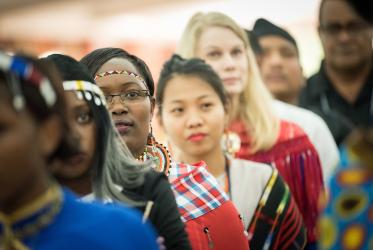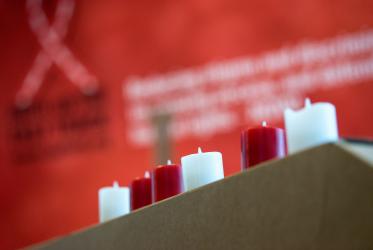You disgust me. “We value you despite our differences.”
I’m scared of you. “Let’s spend some time together.”
Your children cannot come to this school. “All of our children can play together.”
Gathered in prayer and determined to overcome stigma and discrimination, participants in a 7 June interfaith service replaced words of rejection with words of acceptance.
The service, held at the United Nations (UN) Church Center in New York, preceded a UN High Level Meeting on AIDS on 8-10 June. The service was presented by the World Council of Churches Ecumenical Advocacy Alliance.
Rev. Dionne Boissiere, chaplain of the Church Center, said the group was gathered to advocate for the last, the least and the left out. “As sisters and brothers, we commit ourselves to compassion,” she said.
Prof. Dr Riffat Hassan, theologian and Islamic feminist scholar, recited a prayer in Arabic, then offered her blessing to the week’s events. “This is the beginning, the first step,” she acknowledged. “We have to go much further.”
Rabbi Amichai Lau-Lavie, founding director of Storahtelling Inc. and spiritual director of Lab/Shul, reflected on Leviticus 14:2. He invited the congregants to consider: who is the leper? “It’s not just a skin condition but a social situation,” he said, drawing a comparison to HIV and AIDS.
What does HIV and AIDS response require? “Today I want suggest that what we want to do is open our eyes and lift up our heads,” said Rev. Edwin Sanders, II, senior servant at the Metropolitan Interdenominational Church in Nashville, Tennesse (USA). “It is important that we see each other in ways that allow us to be able to discover what it means to be able to truly say we are one. We have to develop the capacity that does not exclude, dismiss, or discount anybody.”
Leaving nobody behind and ending stigma and discrimination were recurring themes of the service, during which people also lit candles to remember loved ones lost to AIDS. Praying in the Bahá'í tradition, Bani Dugal, principal Bahá'í representative to the UN, asked that “the perilous darkness of ignorant prejudice may vanish.”
Keeping a fresh perspective on ongoing work is key to renewing one’s passion in HIV and AIDS response, said Rev. Dr TK Nagaki, representing the Buddhist Council of New York. “The wisdom I share with you is, don’t forget to keep a beginner’s mind, pure and determined,” he said.
A recurring theme in prayer was that all humans are equal before God. Monsignor Robert Vitillo, permanent observer, Mission of the Holy See to the UN, prayed that those responding to HIV and AIDS would remember to put the human person at the center of all plans and strategies. “Remind us of the life and dignity from conception to natural death that you have gifted to all of us,” he said.
Related links:
Photos from the Interfaith prayer on the eve of UN High Level Meeting on AIDS, 2016
Raw video footage of interfaith prayer at HLM 2016 AIDS
Faith community issues call to action: end AIDS by 2030
More information on the High Level Meeting on AIDS and WCC-EAA talking points










